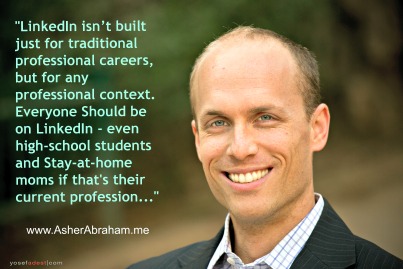Why Students Should Be Using LinkedIn
1July 14, 2013 by Asher
LinkedIn’s slogan and founding principle is: Relationships Matter ®. It is the largest network of professionals today with over 225 million users worldwide, where people are seeking to grow their career and do business with one another. It is the ultimate platform to access new relationships. I recently heard that LinkedIn is expected to have over 1 billion members by 2020.
Most students don’t value LinkedIn very much simply because they do not consider themselves “professionals” yet, so what’s a “professional network” to them?
Some don’t see the value in using LinkedIn, and some just don’t know what to do with it. Most students live a “non-professional” lifestyle – students go to classes and bars, not to an office. And for many, the word “professional” conjures up an image of a lawyer or a doctor – something their parents do.
For many students the concept of a professional means the traditional interpretation of the word. We tend to attach the professional label when people have certifications and diplomas. Many people associate the word professional with someone in a suit and tie, someone getting paid for their knowledge, or a person with an impressive sounding title they have no interest in having. At best, many students will come to use LinkedIn as a resume in hopes of finding an internship or a job.
I recently met a person who is in charge of fundraising for an international organization. When I said to him, “you probably love using LinkedIn…” he responded: “not really, I’m not looking for a job”… to him (and many others), that’s what LinkedIn is for.
But even if you don’t consider yourself a professional because you’re still a student, relationships still matter – and LinkedIn could be very valuable for your future career.
Besides, aren’t you a professional with what you’re doing for the bulk of the day as a student? Don’t you have goals and outcomes you would like to create? Aren’t you looking for new information and opportunities to grow your current “career” as a student? Don’t you value relationships in YOUR CURRENT professional context?
Since LinkedIn is now used for everything career/business, students should have an active LinkedIn profile and grow their network like any other professional.
Accessing new relationships can lead to open doors now and in the future, and there are many people on LinkedIn that can help students in their current professional missions – or even just to figure out what that would do later. Students can follow their schools, connect with other students, professors, educators, advisers, authors, etc.
LinkedIn isn’t just built for traditional professional careers but for anyone serious about their goals in life.
See the difference?
Everyone should be on LinkedIn. Even high-school students and Stay-at-home moms if that’s their current profession. It’s time to re-frame the word Professional. Re-framing is the process of completely reshaping the way we view something – whether a word, a situation, or an object. To re-frame the word professional, I invite you to take on this interpretation:
A professional is someone who is committed and serious about their endeavors. Period.
If you’re committed to your goals and your future, use LinkedIn so that other committed people can help you get there.
LinkedIn is the largest professional network where committed people help other committed people with advice, introductions, services, products, skills, etc. it’s a productive platform where people accomplish things, and access new relationships – even for students, relationships DO matter.
To get started, check out the video below and my latest post about the 2 Most Important Parts of Your LinkedIn Profile and How to Get it Right



[…] 1. Don’t just “BE” on LinkedIn – Engage with people. Be an active participant in your specific market, and the community as a whole. Leave your mark where it counts, comment with value and share information that your network will appreciate. That’s how they begin to “know” you – and possibly like what you have to offer their company as a professional or even as student. […]